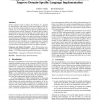Free Online Productivity Tools
i2Speak
i2Symbol
i2OCR
iTex2Img
iWeb2Print
iWeb2Shot
i2Type
iPdf2Split
iPdf2Merge
i2Bopomofo
i2Arabic
i2Style
i2Image
i2PDF
iLatex2Rtf
Sci2ools
138
click to vote
ICFP
2010
ACM
2010
ACM
Scrapping your inefficient engine: using partial evaluation to improve domain-specific language implementation
Partial evaluation aims to improve the efficiency of a program by specialising it with respect to some known inputs. In this paper, we show that partial evaluation can be an effective and, unusually, easy to use technique for the efficient implementation of embedded domain-specific languages. We achieve this by exploiting dependent types and by following some simple rules in the definition of the interpreter for the domain-specific language. We present experimental evidence that partial evaluation of programs in domain-specific languages can yield efficient residual programs whose performance is competitive with their Java and C equivalents and which are also, through the use of dependent types, verifiably resource-safe. Using our technique, it follows that a verifiably correct and resource-safe program can also be an efficient program. Categories and Subject Descriptors D.3.2 [Programming Languages]: Language Classifications--Applicative (functional) Languages; D.3.4 [Programming Lan...
Dependent Types | Domain-specific Languages | ICFP 2010 | Partial Evaluation | Programming Languages |
| Added | 09 Nov 2010 |
| Updated | 09 Nov 2010 |
| Type | Conference |
| Year | 2010 |
| Where | ICFP |
| Authors | Edwin Brady, Kevin Hammond |
Comments (0)

